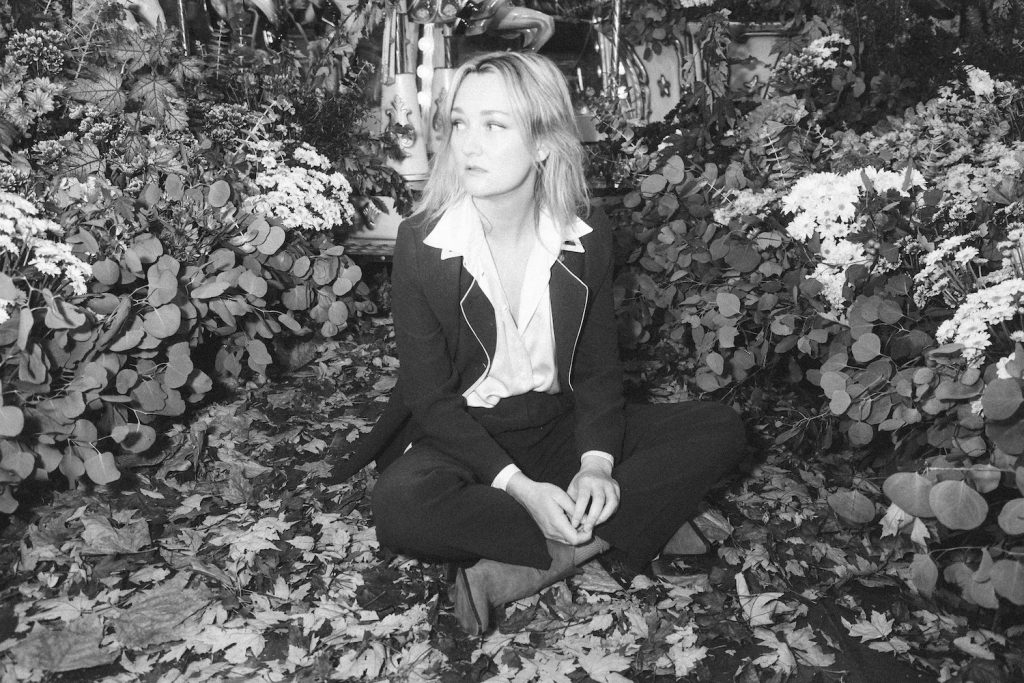
Australian singer/songwriter Elizabeth M. Drummond had a band, a major-label career and a five-year relationship. It all came crashing down after an encounter with a medium. In the wake of it all, a lower-key indie reboot finds her confidently rising from the musical (and personal) ashes.
The first time Elizabeth M. Drummond and I speak (“I go by Liz; that name is just a way to take the piss out of the industry, really”) is on the day of the 19th anniversary of the death of Elliott Smith. It’s a coincidence, to be sure; but also, a symbolic connection with an artist whose music not only resonates with Drummond, but with whom her career bears more than a passing resemblance.
After a prosperous suburban upbringing in Sydney, Australia, Drummond formed the band Little May with school friends Hannah Field and Annie Hamilton in 2012. The group’s all-female lineup and folk-oriented sound “felt like safety” to Drummond and quickly took off. They very rapidly found themselves a publicist, a manager and a booking agent and were “involved in label conversations almost immediately,” says Drummond. “Eventually, we signed to Dew Process/Universal/Capitol (in the U.S.) and Island (U.K.), and the industry caught on.” Triple j (Australia’s government-funded national radio station) added Little May to its playlist, the band’s plays via the Hype Machine site increased, live dates were booked. “It all moved really fast,” says Drummond. “It was a blur.”
Little May released a self-titled EP in 2014, which attracted even more attention, and then the group’s career caught fire in earnest. “We even made up a dream list of producers for our first album,” says Drummond. On the band’s dream list was the National’s Aaron Dessner, who invited Little May to join him in upstate New York at Hudson-based residential studio Future-Past, a 19th-century former Lutheran church converted to recording and rehearsal space that has hosted the likes of the National, Last Shadow Puppets, War On Drugs and Merchandise. Despite the homey vibes and Dessner’s relatively gentle approach, Drummond couldn’t shake a feeling she’d known all too well since childhood: anxiety.
“One common thread throughout my career is that I’m an anxious person,” says Drummond. “On our first record with Aaron, we had all the National’s gear surrounding us there in the studio. And amazing as it was, I couldn’t really relax because we were so in awe of him.”
After the band adjourned to the more hospitable and low-key environs of Dessner’s backyard studio in Brooklyn, Little May released inaugural full-length, For The Company, in 2015. At its core were an accomplished batch of songs. Part First Aid Kit (right down to the close country/folk harmonies), part Sharon Van Etten, the LP hit something of a sweet spot in the mid-2010s and saw Little May garnering airplay with tracks “Cicadas” and “Boardwalks,” acoustic numbers with grand arrangements that felt radio-ready and built for the stage that was occupied at that moment by similarly minded acts such as the Avett Brothers, Mumford & Sons and the Head And The Heart.
But like Elliott Smith—an artist bucking against the indie success of his band Heatmiser by creating a parallel path with a lower-key, more introspective brand of skeletal acoustic portraits—Drummond too felt like something was “off.” Hamilton left Little May at the beginning of 2017 to pursue a solo career, and while Drummond and Field were unified in their vision for a second album, it still felt laborious. A combination of touring burnout, consistent roadblocks, physical distance (Drummond and Field lived in different cities) and a sea of opinions made it difficult to execute.

“Hannah’s partner Rob (Mulnos, who also played in their backing band) came in to help, as did producer Dylan Adams,” says Drummond. “In the end, it took years to finish. And at that point (Blame My Body was finally released in 2019), the industry had given up on us. It had just taken too long; we didn’t even tour that record. I went to go see a tarot-card reader and was crying in front of her. I could barely think or function at that point. Plus I had been in a relationship for five years—throughout most of Little May—that was just toxic, not healthy for me. And it all fell apart after that. I left the band; my relationship just kind of crumbled. I moved out and took a little apartment in Sydney with four other people.
“It took me years to recover, to quit alcohol, to come off the drugs I was on for anxiety. I just figured, ‘I’m done, I missed the boat.’ I’d been told by so many people that I’d aged out. And Hannah was Little May’s frontwoman. We had a complicated bond, truly like sisters. She had her own things she was going through, working out. My issues were around self-doubt and shyness and, eventually, not feeling true to myself musically.”
This might have been the end of Drummond’s career, but for a move to Melbourne and reconnection with a different, more independent music community that created something of a new lease on life for her, artistically. In the same way that Elliott Smith’s departure from Heatmiser (and that band’s roaring, jagged punk) produced a lane for him to become who he was meant to be musically, Drummond’s exit from the band she had co-founded gave her the chance to begin anew. Enter: Congratulations, Drummond’s self-released, six-track, debut EP, due November 18.
“I was writing but not really ‘for’ anything,” says Drummond. “I just didn’t trust anyone anymore. Before, I didn’t feel like I was saying anything musically that was worth saying. I probably didn’t know myself until age 29, at least musically.” (Drummond just celebrated her 32nd birthday).
But bit by bit, the songs that comprise Congratulations began to emerge from the wreckage of Little May and Drummond’s first bout with an industry not particularly well-suited to nurturing artists with a bag full of doubts and demons. The six tracks on Congratulations are an extraordinarily diverse survey of what Drummond is capable of when freed from the shackles of Little May. “I Tried” could nearly be a trip-hop track from the ‘90s (featuring a surprising instrumental interlude that sounds like a warped mellotron swimming for the surface), while the title track (with its wobbly indie guitars and emotional ennui) rings true to Cat Power circa What Would The Community Think. “Crisis” flies closer to 2000’s NYC indie rock (right down to its self-skewering lyrics: “The pills won’t change my mind/Just validate the crisis”), and “Underground” is the closest Drummond comes to radio pop. Then there’s “Bullet,” an Elliott Smith-meets-Beth Orton acoustic ballad with strings and steel guitar that wouldn’t feel out of place soundtracking a Gus Van Zandt or Wes Anderson film, filled with miniaturized details and an exhausted, exquisite sadness that is actually much closer to the actual Elizabeth M. Drummond herself. She even throws in a cover of the Psychedelic Furs’ “Love My Way” that only bears marginal resemblance to the original, a reinterpretation that pulls off that rare trick of making you completely re-evaluate the Furs’ version. It’s the pink-and-green dayglo pop of the ‘80s, but with a goth paint job applied.
“I think I’ve finally realized what makes me happy, and that looking after myself is the number one priority now,” says Drummond somewhat triumphantly. “Little May was mostly about too many people putting too many fingers in the pie. I just want to keep putting out the music that I like. I don’t want to decide on a ‘sound’ or theme yet. Throughout my time in Little May, I had so many opinions. There was so much experimenting I wanted to do. I guess I was ‘the difficult one.’ That time period was so damaging, but also illuminating. I guess I’m just now kind of scratching the surface of how weird I am.” She laughs. “I learned from my experience in the band that I can pass as ‘not weird.’ But I just don’t fucking care anymore about other people’s opinions of my music, of me. I just want to keep it small and do my own little thing.”
Which has the capacity, in its way, to become a next big thing for Drummond. And for indie-pop, too.
—Corey duBrowa






